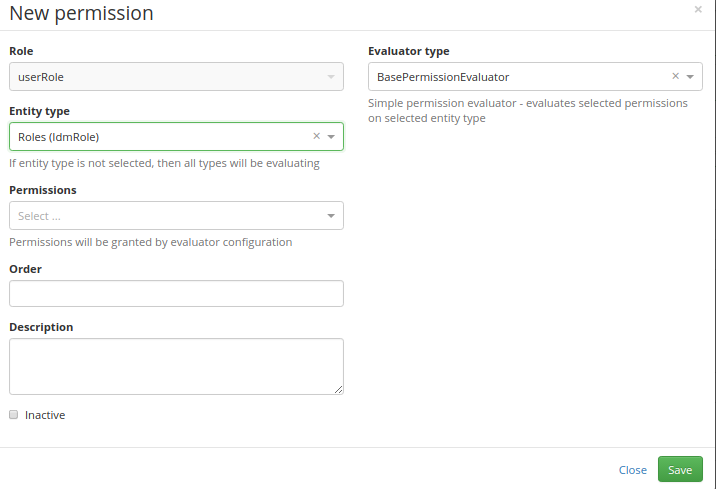Authorization - Create a new evaluator
Step 1. create evaluator
The most easiest way is to copy some existing evaluator and just refactor its name, package, constructor and everything you need. Good for copy is for example RoleGuaranteeEvaluator, this evaluator returns all roles, of which the logged user is the guarantee.
As you can see RoleGuaranteeEvaluator extends AbstractAuthorizationEvaluator and as a generic type there is the class IdmRole (generic type is always entity not DTO!) On the next picture you can see that generic type is on FE shown as Entity type.
Step 2. two main methods
In almost every evaluator is two main methods in which is written almost complete logic. These methods is getPredicate and getPermissions. Simple description these methods (if you want some betyter description go to Authorization policies):
getPredicate
getPredicate is method in which we will add access to data. Evaluators only add, never limit the given set. Example: if you have some evaluator that add all identities you will be not able to remove some identities or annul this set. You are able only to extends set.
getPermissions
In this method you can add or remove Permissions. From super class you get empty set. super.getPermissions(entity, policy); If you want add all permission that it was set via frontend use this (Object AuthorizationPolicy contains all permission that is set via FE): permissions.addAll(policy.getPermissions()); Basic permission: CRUD (Create, Read, Udpdate, Delete), Administration (all of CRUD), View in select box (autocomplete). Example of setting permissions via FE:
Add some logic
Now we have prepare basic evaluator that not contains logic.
@Component @Description("Testing evaluator.") public class TestingEvaluator extends AbstractAuthorizationEvaluator<IdmRole> { @Autowired public TestingEvaluator() { } @Override public Predicate getPredicate(Root<IdmRole> root, CriteriaQuery<?> query, CriteriaBuilder builder, AuthorizationPolicy policy, BasePermission... permission) { return null; } @Override public Set<String> getPermissions(IdmRole entity, AuthorizationPolicy policy) { Set<String> permissions = super.getPermissions(entity, policy); permissions.addAll(policy.getPermissions()); return permissions; } }
Our evaluator will be add access for user to roles that name is ended with some value from application properties. At first we will need autowire these beans: SecurityService (for actual logged user) and ConfigurationService (for read application properties), all these beans are from package eu.bcvsolutions.idm.core..
Constructor after autowire:
private final SecurityService securityService; private final ConfigurationService configurationService; @Autowired public TestingEvaluator( SecurityService securityService, ConfigurationService configurationService) { // Assert.notNull(securityService); Assert.notNull(configurationService); // this.securityService = securityService; this.configurationService = configurationService; }
To method getPredicate we will now add check for current logged user.
AbstractAuthentication authentication = securityService.getAuthentication(); if (authentication == null || authentication.getCurrentIdentity() == null) { return null; }
Now we are add get value from application properties and build query:
String valueFromProperties = configurationService.getValue("some_attribute"); // if (hasPermission(policy, permission)) { return query.where( builder.like( root.get(IdmRole_.name), "%" + valueFromProperties ) ).getRestriction(); } return null;
As you see from configurationService we get attribute with key some_attribute and after that we build simple query.
Finished evaluator
There is finished evaluator:
@Component @Description("Testing evaluator.") public class TestingEvaluator extends AbstractAuthorizationEvaluator<IdmRole> { private final SecurityService securityService; private final ConfigurationService configurationService; @Autowired public TestingEvaluator(SecurityService securityService, ConfigurationService configurationService) { // Assert.notNull(securityService); Assert.notNull(configurationService); // this.securityService = securityService; this.configurationService = configurationService; } @Override public Predicate getPredicate(Root<IdmRole> root, CriteriaQuery<?> query, CriteriaBuilder builder, AuthorizationPolicy policy, BasePermission... permission) { AbstractAuthentication authentication = securityService.getAuthentication(); if (authentication == null || authentication.getCurrentIdentity() == null) { return null; } // String valueFromProperties = configurationService.getValue("some_attribute"); // if (hasPermission(policy, permission) && !StringUtils.isEmpty(valueFromProperties)) { return query.where(builder.like(root.get(IdmRole_.name), valueFromProperties)).getRestriction(); } return null; } @Override public Set<String> getPermissions(IdmRole entity, AuthorizationPolicy policy) { Set<String> permissions = super.getPermissions(entity, policy); // String valueFromProperties = configurationService.getValue("some_attribute"); // if (!StringUtils.isEmpty(valueFromProperties) && entity.getName().endsWith(valueFromProperties)) { permissions.addAll(policy.getPermissions()); } return permissions; } }

